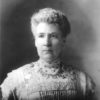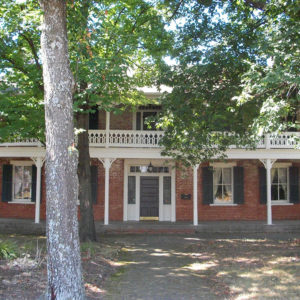calsfoundation@cals.org
Walker-Stone House
The Walker-Stone House at 207 West Center Street in Fayetteville (Washington County) is a two-story red-brick building constructed in 1845. The antebellum structure is one of the few homes still standing in Fayetteville that predate the Civil War. The house was added to the National Register of Historic Places on September 4, 1970.
David Walker arrived in Fayetteville in 1830 and quickly established himself as a lawyer in the new settlement. Elected as prosecuting attorney and as a member of the Arkansas General Assembly, Walker served in the 1836 Constitutional Convention. Acquiring about a thousand acres of land, he became one of the largest slaveholders in Washington County by 1860.
Walker constructed a small house near the Fayetteville Square around 1833, shortly after returning to the state with his new wife, Jane. With a growing family and a successful law practice, as well as farming interests, Walker had a new home constructed on Center Street in 1845.
The house faces north and is rectangular with a small rear ell. The house is fronted by a porch and balcony that span the entire length of the structure. The white painted porch includes six columns and a balustrade with Victorian-era detailing. The entrance includes a centrally located wooden door with both top and side transoms. Another door is centrally located on the second floor, leading to the balcony; it also includes top and side transoms. The north side of the home includes four two-over-two windows evenly spaced on both stories. Each window is framed by wood shutters.
The south side of the home includes a white two-story portico. Each floor on the south side includes four two-over-two windows evenly spaced, although these do not have shutters. Doors with top and side transoms are also centrally located on both the first and second floors. This entrance was used as the main entry into the home during the nineteenth century.
Each end of the building includes an interior brick chimney. Entry into the building from either side leads into a central hallway that is replicated on the second floor. Access to the second floor is gained by a straight stairway located in the central hallway. The building includes a basement. A wing on the west side of the home was added at an unknown date. At the time of the addition of the property to the National Register, the wing included a garage.
Stephen Stone, a merchant in Fayetteville, purchased the home from Walker in 1850. Stone lived in the home with his wife, Amanda Stone, and the couple had a total of eleven children. The building was reportedly struck by a cannonball in late 1864 during the Civil War. Sometime after Stephen died in 1909 and Amanda died in 1912, the home was sold by the Stone family. Extensive renovations took place in the interior of the building, leading to the creation of four apartments in the structure.
At the time the home was added to the National Register, Edward Durrell Stone, grandson of Stephen and Amanda Stone, owned the building. He planned to restore it and eventually give the property to the University of Arkansas (UA) in Fayetteville. Stone died in 1978, however, and the home was purchased that same year by the KHT Company, owned by Hugh Kincaid, David Horne, and Bass Trumbo.
Various law firms operated in the building for several years, and the Fayetteville Advertising and Promotion Commission purchased the building in 2016 to use the space for events. In 2023, plans were made to use the building as a music space operated by the founders of the Fayetteville Roots Festival. The building continues to be owned by the Fayetteville Advertising and Promotion Commission.
For additional information:
Bartholomew, Dustin. “Folk School of Fayetteville to Set up Shop in Historic Walker-Stone House.” Fayetteville Flyer, February 7, 2023. https://www.fayettevilleflyer.com/2023/02/07/folk-school-of-fayetteville-to-set-up-shop-in-walker-stone-house/ (accessed July 21, 2023).
Gill, Todd. “Fayetteville A&P Looks to Buy Historic Walker-Stone House.” Fayetteville Flyer, May 17, 2016. https://www.fayettevilleflyer.com/2016/05/17/fayetteville-ap-looks-to-buy-historic-walker-stone-house/ (accessed July 21, 2023).
“Judge David Walker House – Stephen K. Stone House.” National Register of Historic Places registration form. On file at Arkansas Historic Preservation Office, Little Rock, Arkansas. Online at https://www.arkansasheritage.com/arkansas-historic-preservation-program (accessed July 21, 2023).
Lemke, Walter J., ed. The Life and Letters of Judge David Walker of Fayetteville: Justice of the Arkansas Supreme Court, 1848–1878. Fayetteville, AR: Washington County Historical Society, 1957.
———. The Walker Family Letters. Fayetteville, AR: Washington County Historical Society, 1956.
David Sesser
Southeastern Louisiana University
 Historic Preservation
Historic Preservation Louisiana Purchase through Early Statehood, 1803 through 1860
Louisiana Purchase through Early Statehood, 1803 through 1860 Walker-Stone House
Walker-Stone House 




The present-day back of the house was originally the impressive front, with a semicircular driveway and a large front yard facing Mountain Street.
2024: The Walker Stone House is now occupied by the Folk School of Fayetteville. https://www.folkschooloffayetteville.org/